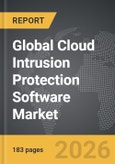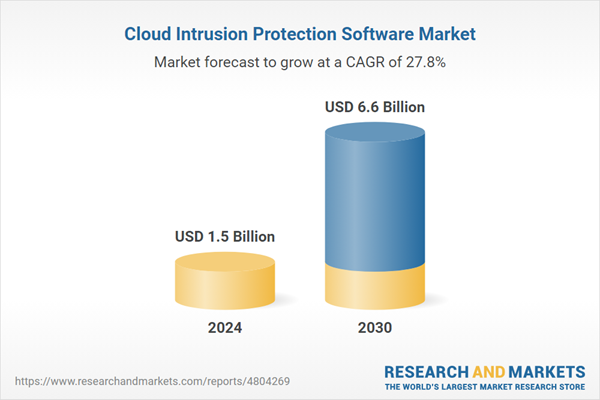Global Cloud Intrusion Protection Software Market - Key Trends and Drivers Summarized
What Exactly Is Cloud Intrusion Protection Software, and How Does It Work?
Cloud Intrusion Protection Software (IPS) is a crucial element in the overall cloud security framework, designed to prevent unauthorized access, malicious attacks, and potential breaches within cloud environments. This software continuously monitors incoming traffic, user behavior, and application processes, instantly identifying and mitigating any suspicious activity that may indicate an attempted intrusion. What distinguishes Cloud IPS from traditional systems is its proactive approach - rather than simply detecting threats, it actively blocks or neutralizes them in real-time. Deployed in a cloud-native environment, this software utilizes the vast computing resources of the cloud to analyze vast amounts of data, providing robust, scalable protection for dynamic cloud workloads. Cloud Intrusion Protection Software is particularly effective in addressing the unique challenges posed by cloud infrastructures, where data is distributed across different regions, services, and platforms, offering an elastic, comprehensive defense mechanism that grows with the organization's needs.Why Is Cloud Intrusion Protection Software Essential for Businesses Today?
As businesses transition to cloud platforms to improve agility, cost-efficiency, and global reach, securing these cloud environments has become increasingly critical. The traditional on-premise security systems that were once sufficient are no longer adequate in a cloud-based world, where data and applications are decentralized and accessible from virtually anywhere. Cloud Intrusion Protection Software offers a solution to this challenge, specifically designed to provide comprehensive security in a cloud-native ecosystem. In a multi-cloud or hybrid cloud setting, where businesses leverage multiple cloud providers alongside their on-premise infrastructure, the risk of exposure increases. This software helps to maintain centralized control over cloud security while continuously adapting to new threats. One of the key reasons businesses are investing heavily in Cloud IPS is the rise in cyberattacks targeting cloud environments. As cloud platforms grow in popularity, they have become prime targets for hackers aiming to exploit vulnerabilities such as misconfigured cloud settings or unsecured APIs. Cloud Intrusion Protection Software helps mitigate these risks by offering real-time threat intelligence and automated defense mechanisms, ensuring that security breaches are identified and stopped before they can escalate into more severe incidents.How Is Technology Advancing Cloud Intrusion Protection Software?
Technological advancements are significantly shaping the future of Cloud Intrusion Protection Software, allowing it to become more intelligent, efficient, and responsive. Artificial Intelligence (AI) and Machine Learning (ML) are at the forefront of these innovations, helping IPS to continuously evolve by learning from previous security incidents and improving the detection of abnormal patterns that might signal an intrusion. This learning-based approach enables the software to identify new, previously unknown threats, often referred to as zero-day attacks, which are difficult for traditional signature-based systems to detect. Additionally, automation is transforming how Cloud IPS responds to threats. Automated defense mechanisms can instantly execute protective actions, such as blocking malicious IPs, isolating infected virtual machines, or dynamically adjusting firewall settings without human intervention. This significantly reduces the response time to attacks, which is critical in preventing potential data loss or system disruption. Moreover, the rise of microservices and containerized applications adds complexity to cloud security, making it essential for Cloud IPS solutions to offer deeper visibility into cloud workloads, inspecting network traffic at the granular level. Integration with DevSecOps practices further ensures that security is embedded throughout the development and deployment pipelines, allowing security to move at the pace of modern application development.What Are the Key Drivers Behind the Growing Cloud Intrusion Protection Software Market?
The growth in the Cloud Intrusion Protection Software market is driven by several factors, each contributing to the increasing demand for comprehensive cloud security solutions. First and foremost is the sharp rise in cloud adoption by businesses across industries, driven by the need for scalability, flexibility, and remote access. As more organizations move critical workloads and sensitive data into the cloud, the potential attack surface expands, necessitating the use of robust security solutions like Cloud IPS to protect against the rising tide of cyber threats. Additionally, the sophistication of cyberattacks has increased significantly, with attackers leveraging advanced techniques such as AI-driven attacks, social engineering, and ransomware targeting cloud infrastructure. These evolving threats have made traditional perimeter-based security models obsolete, pushing businesses to adopt more advanced, cloud-native protection measures. Regulatory pressures are also a key growth driver. As governments and regulatory bodies enforce stricter compliance requirements around data privacy and security - such as GDPR in the EU and HIPAA in the healthcare industry - businesses are under pressure to implement comprehensive security measures to avoid penalties. Cloud Intrusion Protection Software plays a crucial role in helping companies maintain compliance by providing the tools needed to monitor, report, and respond to potential breaches in real time. Lastly, consumer behavior is shifting, with greater demand for faster, more secure digital services across sectors like banking, e-commerce, and healthcare. Businesses must ensure that their cloud services are both fast and secure, leading to the increased adoption of Cloud IPS solutions to safeguard consumer trust and protect sensitive data. As these trends continue to evolve, the demand for advanced cloud security solutions is expected to surge, making Cloud Intrusion Protection Software a critical investment for modern enterprises.Report Scope
The report analyzes the Cloud Intrusion Protection Software market, presented in terms of market value (USD). The analysis covers the key segments and geographic regions outlined below.- Segments: Service (Design & Integration, Managed Services, Consulting, Training & Education); End-Use (Travel & Transport, Entertainment & Media, Retail, BFSI, Healthcare, Oil & Gas, Other End-Uses).
- Geographic Regions/Countries: World; United States; Canada; Japan; China; Europe (France; Germany; Italy; United Kingdom; and Rest of Europe); Asia-Pacific; Rest of World.
Key Insights:
- Market Growth: Understand the significant growth trajectory of the Design & Integration Service segment, which is expected to reach US$3 Billion by 2030 with a CAGR of 30.7%. The Managed Services segment is also set to grow at 28% CAGR over the analysis period.
- Regional Analysis: Gain insights into the U.S. market, valued at $423.8 Million in 2024, and China, forecasted to grow at an impressive 26.1% CAGR to reach $975.8 Million by 2030. Discover growth trends in other key regions, including Japan, Canada, Germany, and the Asia-Pacific.
Why You Should Buy This Report:
- Detailed Market Analysis: Access a thorough analysis of the Global Cloud Intrusion Protection Software Market, covering all major geographic regions and market segments.
- Competitive Insights: Get an overview of the competitive landscape, including the market presence of major players across different geographies.
- Future Trends and Drivers: Understand the key trends and drivers shaping the future of the Global Cloud Intrusion Protection Software Market.
- Actionable Insights: Benefit from actionable insights that can help you identify new revenue opportunities and make strategic business decisions.
Key Questions Answered:
- How is the Global Cloud Intrusion Protection Software Market expected to evolve by 2030?
- What are the main drivers and restraints affecting the market?
- Which market segments will grow the most over the forecast period?
- How will market shares for different regions and segments change by 2030?
- Who are the leading players in the market, and what are their prospects?
Report Features:
- Comprehensive Market Data: Independent analysis of annual sales and market forecasts in US$ Million from 2024 to 2030.
- In-Depth Regional Analysis: Detailed insights into key markets, including the U.S., China, Japan, Canada, Europe, Asia-Pacific, Latin America, Middle East, and Africa.
- Company Profiles: Coverage of players such as Alien Vault, Inc., Check Point Software Technologies Ltd., Cisco Systems, Inc., Dell Technologies, Extreme Networks, Inc. and more.
- Complimentary Updates: Receive free report updates for one year to keep you informed of the latest market developments.
Some of the 24 companies featured in this Cloud Intrusion Protection Software market report include:
- Alien Vault, Inc.
- Check Point Software Technologies Ltd.
- Cisco Systems, Inc.
- Dell Technologies
- Extreme Networks, Inc.
- Forcepoint LLC
- Fortinet, Inc.
- Hewlett-Packard Development Company LP
- IBM Corporation
- Juniper Networks, Inc.
- McAfee LLC
- Symantec Corporation
- Trustwave Holdings, Inc.
This edition integrates the latest global trade and economic shifts into comprehensive market analysis. Key updates include:
- Tariff and Trade Impact: Insights into global tariff negotiations across 180+ countries, with analysis of supply chain turbulence, sourcing disruptions, and geographic realignment. Special focus on 2025 as a pivotal year for trade tensions, including updated perspectives on the Trump-era tariffs.
- Adjusted Forecasts and Analytics: Revised global and regional market forecasts through 2030, incorporating tariff effects, economic uncertainty, and structural changes in globalization. Includes historical analysis from 2015 to 2023.
- Strategic Market Dynamics: Evaluation of revised market prospects, regional outlooks, and key economic indicators such as population and urbanization trends.
- Innovation & Technology Trends: Latest developments in product and process innovation, emerging technologies, and key industry drivers shaping the competitive landscape.
- Competitive Intelligence: Updated global market share estimates for 2025, competitive positioning of major players (Strong/Active/Niche/Trivial), and refined focus on leading global brands and core players.
- Expert Insight & Commentary: Strategic analysis from economists, trade experts, and domain specialists to contextualize market shifts and identify emerging opportunities.
Table of Contents
Companies Mentioned (Partial List)
A selection of companies mentioned in this report includes, but is not limited to:
- Alien Vault, Inc.
- Check Point Software Technologies Ltd.
- Cisco Systems, Inc.
- Dell Technologies
- Extreme Networks, Inc.
- Forcepoint LLC
- Fortinet, Inc.
- Hewlett-Packard Development Company LP
- IBM Corporation
- Juniper Networks, Inc.
- McAfee LLC
- Symantec Corporation
- Trustwave Holdings, Inc.
Table Information
| Report Attribute | Details |
|---|---|
| No. of Pages | 183 |
| Published | January 2026 |
| Forecast Period | 2024 - 2030 |
| Estimated Market Value ( USD | $ 1.5 Billion |
| Forecasted Market Value ( USD | $ 6.6 Billion |
| Compound Annual Growth Rate | 27.8% |
| Regions Covered | Global |









